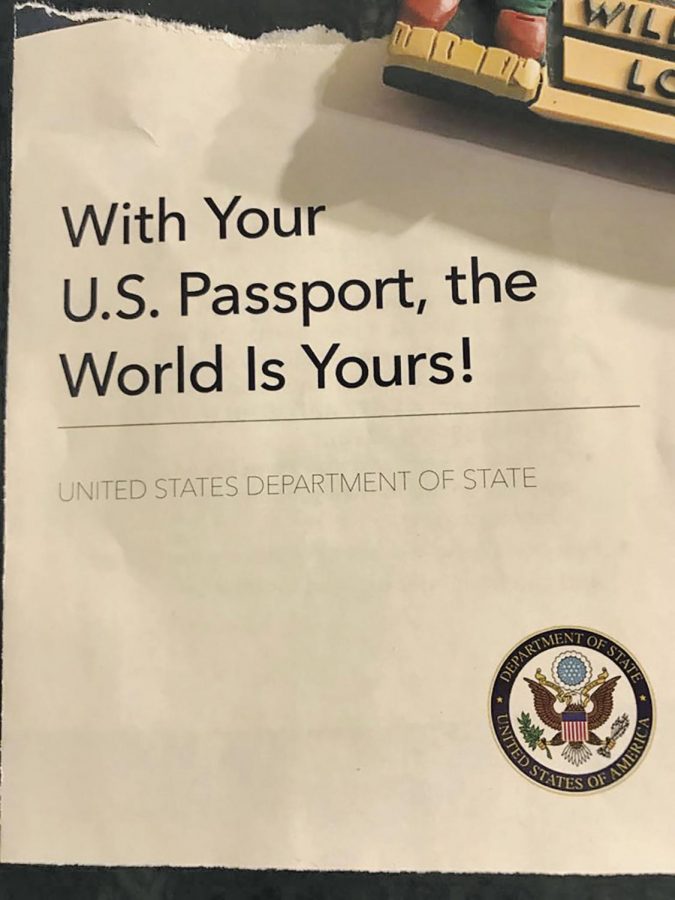SEU Student abroad Challenges U.S. attitudes
In July, I extract a new passport from the envelope that has taken residence at the bottom of my grandmother’s sock drawer for the better part of the spring semester. It is my replacement for the one that I, an incautious and inexperienced traveler, lost two summers ago in London.
When I open the envelope, a small brochure slips out with some useful information: what to do if you lose your passport, where you should go to replace it, etc. But like many college students, despite having already lost my passport once, I ignore all the important details on the card knowing that I will never (again) need to use them.
I am poised to throw the paper in the trash, unamused by the US Department of State’s unnecessary abuse of resources on such ephemerae; it was evident to me that in case of an emergency, Google would tell me what to do anyways.
Just as I am about to toss it, though, the slogan on the front of the pamphlet stops me. In plain blue letters, above the nation’s seal, the paper reads “With your US Passport, the world is yours.”
I laugh, but the subtle air of imperialism around the phrase troubles me; by definition, if the world belongs exclusively to US passport holders, it doesn’t belong to anyone else. This provokes me to think about what the US passport itself implies; namely the privilege of being able to make such confident presumptions, even as there are so many people living in the US who don’t relate to that statement.
My interpretation seems harshly hyperbolic given that the context of the message is an outdated, clip-art marketing attempt by the US government. Even so, the more I read it, the more hubristic and problematic it begins to sound.
Months later, in transit to Madrid where I will spend the Fall semester, I catch several connecting flights and pass through security lines with my US Passport, largely unscrutinized.
I arrive and do the requisite sightseeing, but what I am most interested in are the museums. Apart from these excursions, I stay far away from tourist centers, preferring to stick to my small, modest enclave 20 minutes from the heart of Madrid, Spain.
The events in my life pass quietly on this side of town, where no tourists turn up, where locals hardly care about my origins. Here, no one tries to speak English to me like others do downtown. It is a relief; I feel anonymous here, freed from the insolence of the brochure I read months ago.
True horror doesn’t set in until I am seated in an auditorium the week before the start of the term, surrounded by other foreign students enlisted by their own universities to divide and conquer; mainly delegates from other private U.S universities like Georgetown.
I am forced to sit through a presentation on how to adjust to life in Madrid, even though I am already adjusted. If I want my student ID card, I am told, I must first sit and listen to careful instructions on how to eat, drink and kiss like the Spanish do. I find this laundry list of Spanish-isms and “dos and don’ts” ridiculous.
But what I don’t anticipate is outright cultural insensitivity on the part of a humanities department professor charged with helping foreign students.
In perfect English, the woman leading the presentation –our American professor-turned-tour guide– tells us that we should not expect to make Spanish friends, that the Spanish are cliquish and exclusive. She tells us we are better off approaching our study-abroad stint as silent observers who may eventually integrate into the community.
Then, a psychologist comes in and gives a presentation on culture shock. I am barely awake as I watch a slide appear on her PowerPoint depicting a photo of Jane Goodall decked in a safari suit and steno pad, observing some apes.
This woman has just asked us to see our Spanish colleagues as members of another species.
I am sickened, and appalled that no one around me does a thing, including the Spanish professors seated quietly at the front.
For lack of a better plan, I walk out of the auditorium in the middle of the presentation, eventually returning to collect my student ID. No one has noticed my sustained leave– my clear disgust. Everyone else has remained seated, calmly absorbing the “advice” we are being doled for “surviving” in this new and exotic first-world country.
I slump back into my seat and draw in my notebook, drowning out the rest of the psychologist’s presentation. So far, the only thing that has truly astounded me here is how our study abroad program directors have suggested we comport ourselves, and how nobody has challenged this.
It strikes me that, rather than encouraging us to think about all the ways in which we are the same, in all the ways we are united as students and as humans, our program directors have decided to focus on all the blatantly obvious ways we are culturally different from our Spanish colleagues, as if we hadn’t already been well aware.
It strikes me also how privileged we all are sitting in the auditorium. Although there are students from Russia, China, France, and a host of other countries and although we are in Madrid, the presentation has been given in English, for an English audience, about how we all can best enjoy our time in Spain; that is, without having to trouble ourselves too much.
Glancing over at my American compatriots, many of whom are snapchatting, I wonder again whether this is what the US Department of state meant when they wrote “the world is yours,” a burden that appears to have been conferred with little prudence. I hope that it’s not.







